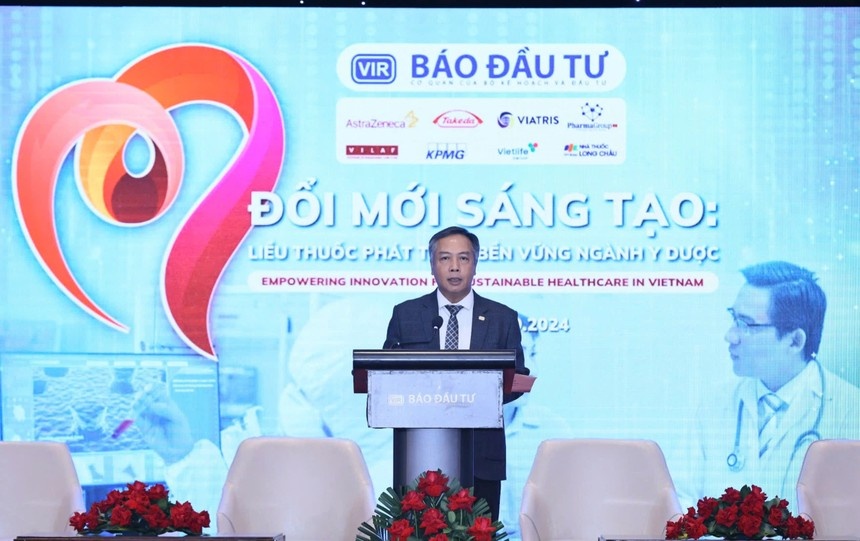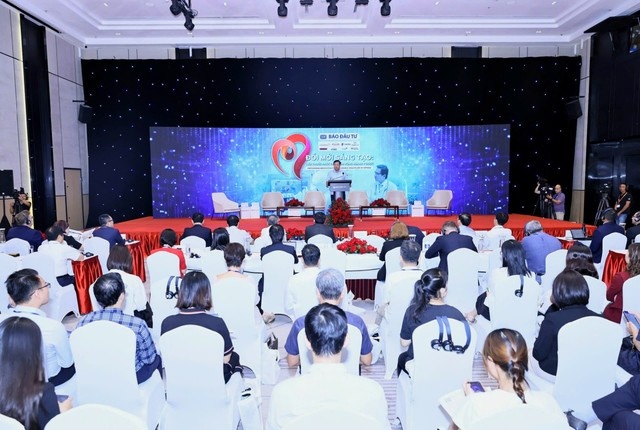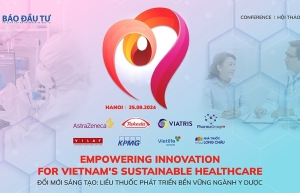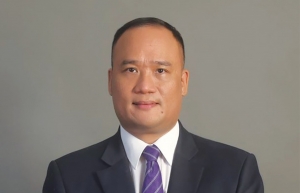VIR conference highlights innovation in Vietnam's healthcare sector
 |
Addressing the conference, Le Trong Minh, VIR’s editor-in-chief, said, "According to World Health Organization (WHO), healthcare innovation is accelerating at an unprecedented pace, especially in the digital space. Technological advances such as AI, gene editing, and VR are changing the detection and treatment of diseases, transforming the global healthcare industry."
“In Vietnam, healthcare innovation has significantly improved the health and life quality of millions of Vietnamese people, enhancing diagnosis and treatment capabilities as well as promoting advances in medical research and pharmaceutical production. However, to ensure innovation and sustainability in the healthcare industry, Vietnam should promote research and development and technology transfer in disease prevention, detection, diagnosis, and treatment. This is coupled with the production of medicines, vaccines, biologicals, and high-quality medical equipment. The country should also perfect policies on health in line with reality while promptly adjusting relevant legal regulations to address emerging issues.”
To facilitate the goal, it is vital to update major global trends, learn the best practices from developed countries, and gain insights from relevant stakeholders. This is particularly important as Vietnam is completing its legal framework for the healthcare industry to enter a new phase of development, he added.
Atul Tandon, general director of AstraZeneca Vietnam, said, “We highly appreciate the efforts of Vietnam to drive innovation and development in the health industry. Over the past few years, Vietnam has witnessed innovation in healthcare infrastructure, private healthcare, and technology application. Upbeat about the outlook of Vietnam, we are committed to investing in innovation and technology and leading several healthcare initiatives for the youth. AstraZeneca is dedicated to transforming the future of healthcare by unlocking the power of what science can do for people, society, and the planet.”
He further noted AstraZeneca is at the forefront of clinical research in the value chain of science and medicine. To date, AstraZeneca has built many laboratories to improve its diagnostic capacity, with initiatives that can be replicated from Vietnam to other countries in Asia. With its patient-centric approach, the company tracks the patient journey and accompanies patients from screening to diagnosis and treatment, thereby contributing to sustainable healthcare development.
 |
Dion Warren, area head of Takeda India and Southeast Asia, said, "Over the past decade, we have made strong commitments to foster public-private partnerships to expand access to innovative medicines and vaccines in Vietnam. We have signed MoUs with partners since 2021 to share technology and techniques to improve diagnosis results. The company also entered into a partnership with the Ministry of Health in 2023 to raise disease awareness, enhance diagnosis capability, and improve patient access to high-quality care."
Takeda has made a strong contribution to combating dengue in Vietnam. According to the WHO, Vietnam is among the top countries facing a growing dengue burden. To ease the burden, the company has partnered with local authorities and other organisations to promote dengue prevention. Specifically, Takeda's dengue vaccine provides an effective tool for Vietnam’s integrated dengue management strategy, Warren added.
Radhika Bhalla, head of Vietnam and Asia Alliance Markets, said, "Viatris Vietnam has an extensive, diversified portfolio encompassing multiple therapeutic areas to address a wide spectrum of health conditions. This includes cardiovascular disease, where over 336,000 patients have benefited, pain management affecting 1.3 million patients, mental health management for 403,000 individuals, treatments for infectious diseases impacting 70,000 patients, and men's health solutions reaching 47,000 patients."
"We also make continued efforts to introduce localised products to the market through technology transfer of off-patent originators. Moving forward, we will continue expanding our portfolio to increase patient access to high-quality medicines and widen treatment options for Vietnamese people. Our unwavering belief is that better access leads to better health, including access to high-quality medicines made in Vietnam while balancing Viatris’ global, regional, and local supply," she said.
 | Empowering innovation for Vietnam's sustainable healthcare VIR plans to host a healthcare conference on September 25, expecting to attract about 200 participants, including policymakers, international organisations, senior experts, and those from the business community. |
 | Takeda’s decade of healthcare commitments in Vietnam For over 10 years, Takeda has been a dedicated healthcare partner in Vietnam, delivering transformative treatments and contributing significant value to public health. The recent approval of its dengue vaccine further strengthens this commitment. Dion Warren, Takeda’s area head for India and Southeast Asia, talked to VIR’s Bich Thuy about the company’s journey and its plans to bring more innovative medicines to Vietnam. |
 | Foreign-led groups seize the initiative in healthcare Vietnam’s healthcare sector is rapidly developing as the country seeks to modernise its system and improve health outcomes for its population. Contributing to this transformation are foreign-invested enterprises (FIEs), which have become key players in driving healthcare innovation across fields such as pharmaceuticals, medical devices, biotechnology, and digital healthcare solutions. |
What the stars mean:
★ Poor ★ ★ Promising ★★★ Good ★★★★ Very good ★★★★★ Exceptional
Related Contents
Latest News
More News
- Digital economy takes centre stage in Vietnam’s new growth model (January 28, 2026 | 11:43)
- EU Council president to visit Vietnam amid partnership upgrade (January 28, 2026 | 11:00)
- Vietnam entering a new growth phase in 2026 (January 28, 2026 | 10:02)
- VIMC targets higher profit and throughput in 2026 (January 26, 2026 | 19:00)
- GEVA a launchpad for Vietnam’s agricultural exports (January 26, 2026 | 12:03)
- Data-driven risk management signals major shift in customs administration (January 24, 2026 | 11:22)
- Cosmetics rules set for overhaul under draft decree (January 24, 2026 | 11:21)
- Vietnam Airlines seeks aircraft through dry lease (January 22, 2026 | 20:43)
- Policy obstacles being addressed in drug licensing and renewal (January 22, 2026 | 20:17)
- Vietnam’s wood exports surpass $17 billion (January 22, 2026 | 20:15)

 Tag:
Tag:



















 Mobile Version
Mobile Version